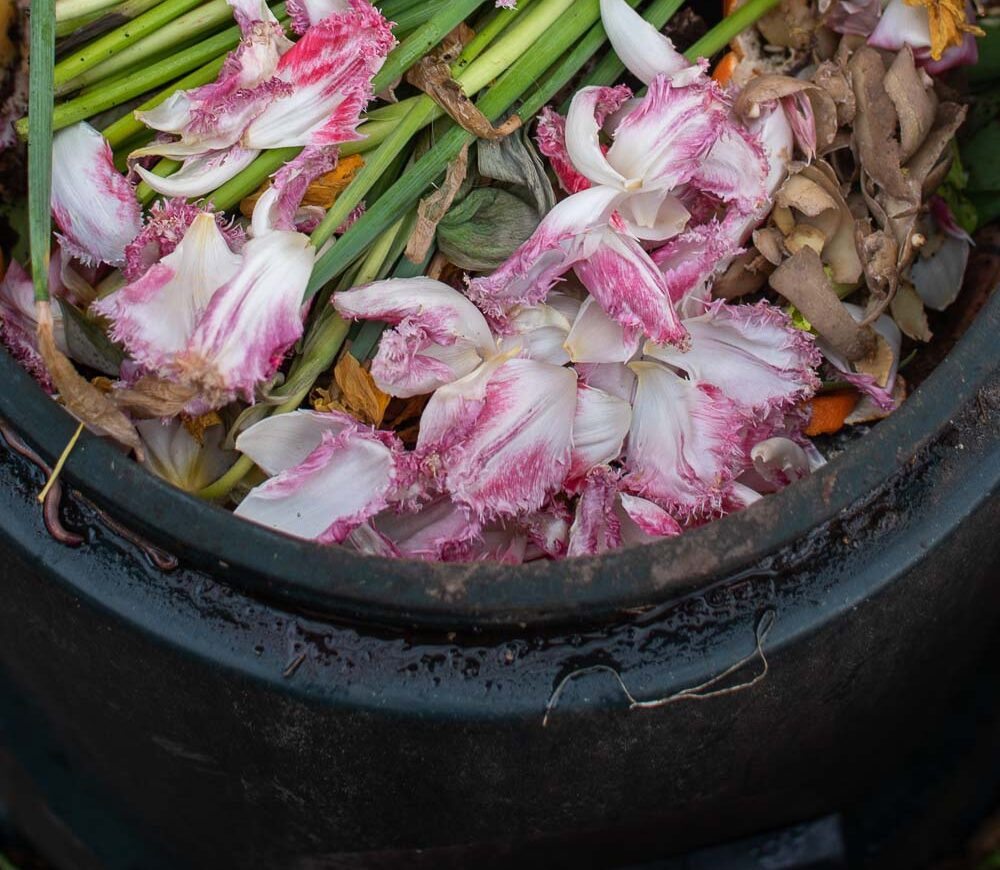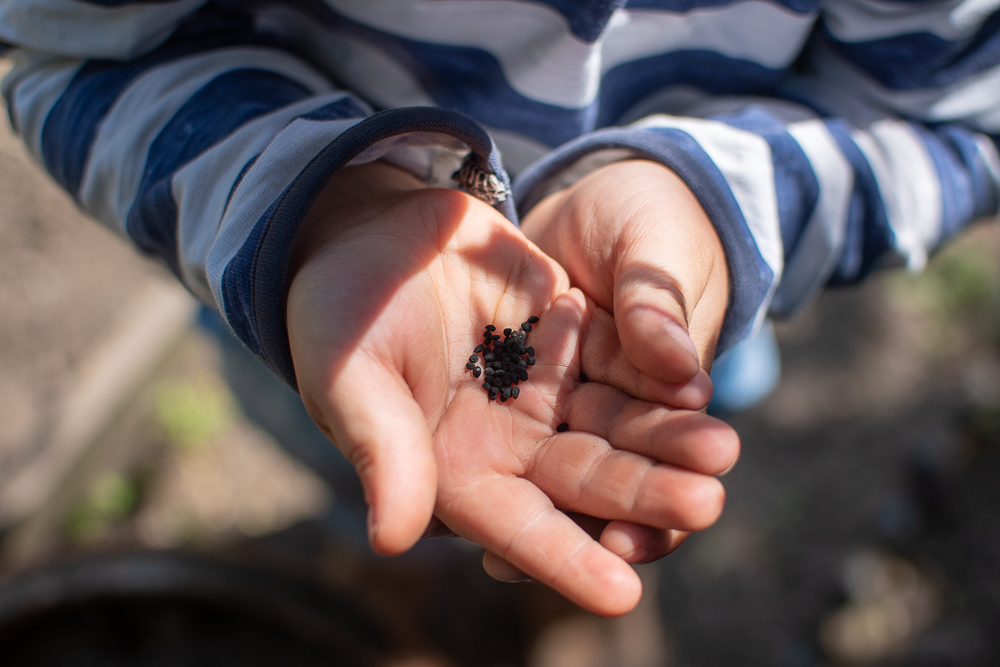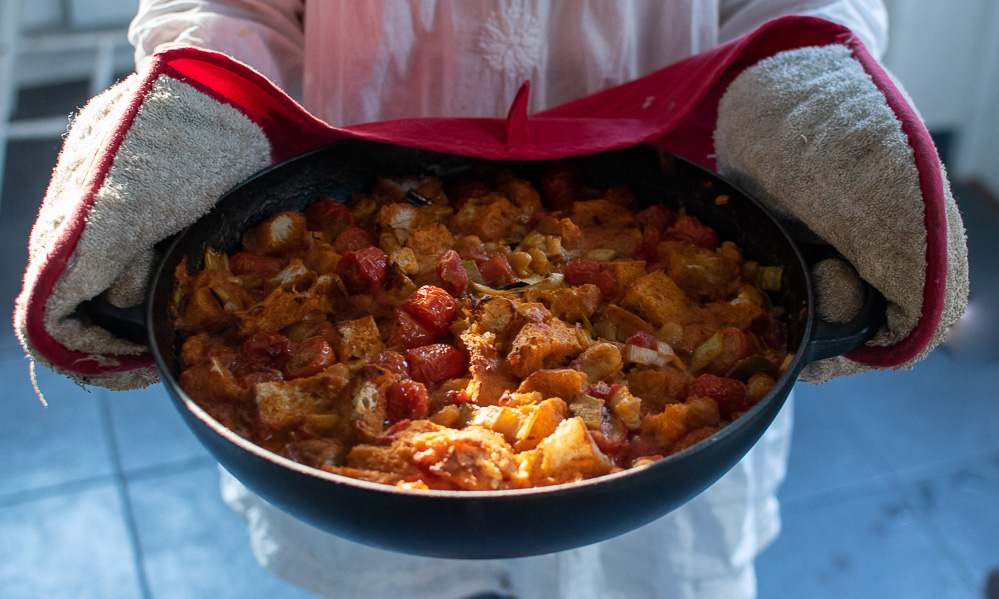A huge 78% of people are worried about climate change and if you’re reading this blog, I’m guessing that’s you. So, I thought I’d come up with a few easy tips to make your home more sustainable. I’ve teamed up with boiler brand Worcester Bosch, to come up with some tips to help you reduce your carbon footprint at home and save a few pennies in the process. And I promise these are all really easy things to do, so here goes:
How to Make your Home Sustainable
1. Compost to reduce your food waste
Only 3% of the UK population compost and yet, if food waste were a country, it would be the third highest emitter of greenhouse gases. Those are scary stats, but composting is really easy. We have a bin at the bottom of the garden that I fill with approx. 50/50 veg & fruit peelings and cardboard. Not only does it remove any guilt when you find that mouldy banana at the bottom of your handbag (or does that just happen to me?!) but you capture all those wonderful nutrients and once broken down you have your very own compost that will do wonders for your window box, balcony or garden.

2. Grow your own veg
Our food travels on average 1500 miles before reaching our plates. So one easy way to cut down on food miles is to grow your own veg. But, confession time, I am not that green fingered. Plus with three kids I don’t have much time to garden, so I opt for things that will grow themselves. We’ve had lots of success with herbs, particularly rosemary and sage which we have in abundance. And my 7-year-old has successfully grown a great crop of strawberries and courgettes.

3. Plan your meals
While we’re on the subject of food, we should talk about meal planning. Personally I loathe doing it but love the results. Since doing this, we definitely have less food waste, a lower weekly shopping bill and more delicious homemade food on the table.
4. Subscribe to a Local Veg Box Scheme
Subscribing to a local fruit and veg box scheme is such a great idea on so many levels. We’ve been getting one weekly for years now and I find it takes the hassle out of deciding what to buy each week. It also ensures farmers are paid properly for their work, keeps food miles to a minimum and seriously reduces the amount of single use plastic you get with your shopping. Which can only be a good thing.
5. Reduce your meat consumption
Becoming Vegan can reduce your carbon footprint by 73%. However, if that is too drastic a lifestyle change, focus on reducing the amount of meat you eat. I’ve actually found that getting a weekly veg box has really helped shift my mindset. Now, when I meal plan, I start by looking at what veg I have rather than thinking first about types of meat. As a family we’ve introduced lots of lentils and chickpeas into our diet to help fill up hungry tummies.

6. Switch to plant based, refillable cleaning products
Switching to refillable plant-based cleaning products is cheaper, more time efficient and more eco-friendly. I use a multi-purpose spray that comes with a refill pouch that costs £15 and contains 10 concentrated doses. So do the maths, that’s just £1.50 per 500ml bottle to refill – amazing. And by using a refillable product you are seriously reducing your single use plastic.
7. Ban the bottle in your bathroom
Over the past few years, we’ve been trying to reduce the number of single-use plastic bottles in our bathroom. We have a tiny bathroom for a family of five, with very little storage, so it was a transition that needed to happen. We now use solid soap, shampoo and conditioner bars, toothpaste tablets and a whole variety of other plastic free products. I’ve written a blog post on it, so do click here to find out more.

8. Have a recycling bin upstairs
I know it sounds obvious, but by having a recycling bin upstairs you’ll be far more likely to actually recycle the paper, card and envelopes that you use. Otherwise, it all just ends up in landfill.
9. Opt for A energy appliances
One way to cut your electricity bill and reduce the amount of energy you are using is to buy energy-efficient One way to cut your electricity bill and reduce the amount of energy you are using is to buy energy-efficient appliances. Whenever we upgrade our white goods, I always look at the energy rating which goes from A to G with A being the most efficient. According to a recent study by Which, “swapping power-guzzling kitchen appliances for energy-saving models could save you up to £308 a year.” And the same is true for your boiler, keep reading.
“one really impactful way of making your home more sustainable is to upgrade your heating system“
10. Upgrade your heating system
22% of the UK’s carbon emissions come from our homes, with 19% via home heating. So one really impactful way of making your home more sustainable is to upgrade your heating system; it will save you money too. By changing your boiler from a G rated boiler to an A grade one you can save approx. £300 a year on energy bills for a detached home with a programmer and room thermostat.
This is much needed as energy bills continue to soar in the UK. It will also help to reduce your carbon emissions for a more sustainable home. For more information on how to save energy through your heating and hot water, click here.
The Worcester Bosch new Greenstar boilers are also capable of running on 20% hydrogen blend. This means your boiler will continue to run even when the government begins to increase the amount of ‘green gases’ into the UK gas grid. This could be a great way to future-proof your heating system and could help save even more carbon.
If a move to 100% hydrogen is made, however, you’ll need to switch to a hydrogen boiler to be carbon-free, a technology currently being developed by Worcester Bosch in trials.
11. Get Savvy Smart Controls
By using smart heating controls you can manage the temperature of your house remotely, potentially saving you up to £70 a year in energy bills. Indeed, if each room has a thermostat, you can even be as specific as to turn the heating up or down in that particular room – incredible. This just means you can heat your house efficiently and according to your own unique lifestyle.
12. Install LED light bulbs
Installing LED lights is a really simple switch to make your home more sustainable and to save some money. LED lights require much less electricity than traditional halogen bulbs, and they last much longer. Also, for every light bulb that you change to LED you can save approx. £2-3 on your electricity bill. If you live in a house then that amount will soon add up!

13. Don’t leave the TV on standby!
Ok, so I love nothing better than to sink down into the sofa with a glass of vino at the end of the day and catch up on the latest Netflix original. But, unless we are watching the TV it is off, not on standby. Standby still uses electricity, so by turning it off you are saving energy, money and helping to make your home more sustainable.
14. Switch to a green energy provider
These days there are lots of energy providers that use entirely green renewable energy. Websites such as TheSwitch do all the hard work for you; they compare the best green energy companies and all you have to do is fill out your details. Make the switch today!

15. Consider insulating your home
In winter we heat our homes, but if they are poorly insulated much of the heat is lost. We have a loft extension which was done in the 80s and has very poor (possibly non-existent) insulation. As a result it’s incredibly hot in summer and freezing in winter. It is on our ‘to do’ list to investigate how we can get it properly insulated to help save on our electricity bill and make our home more sustainable.
To find out more about how to upgrade your boiler and become a carbon reducing hero, click here.
This blog post is sponsored by Worcester Bosch.
